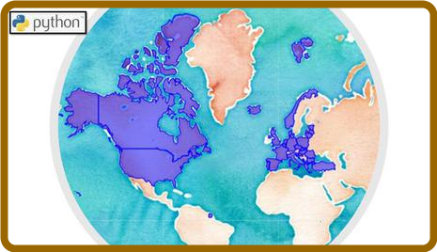
Military Geopolitics Using Data Science
Posted on 22 Sep 15:54 | by mitsumi | 14 views

Published 9/2022
MP4 | Video: h264, 1280x720 | Audio: AAC, 44.1 KHz
Language: English | Size: 1.62 GB | Duration: 3h 20m
Showing how to use Data Science for military & Intelligence
MP4 | Video: h264, 1280x720 | Audio: AAC, 44.1 KHz
Language: English | Size: 1.62 GB | Duration: 3h 20m
Showing how to use Data Science for military & Intelligence
What you'll learn
Military & Intelligence
Geopolitical analyses
History
Data Science and analytics
Economics
Requirements
No requirements because we explore everything in detail.
Description
What is the course аbout: Every country and every alliance (e.g. NATO, SCO, CSTO etc ) has designed possible geopolitical scenarios that may play out in the next 5 years (short-term), 15 years (mid-term) and 50 - 100 years (long-term).Examples of alliances / organisations include the SCO (Shanghai Cooperation Organisation) , the CSTO (Collective Security Treaty Organization) , NATO, the European Union etc, each of which has a number of geopolitical scenarios in place in order to be in a state of readiness for future outcomes, and have reactive plans at its availability.In this course we show how Data Science is used in real-world Geopolitical, Military and Intelligence Scenarios. Alliances are presented, militaty plans are shown, and in -depth presentation of geopolitical scenarios are made. For example, the Long Term Global NATO Geopolitical scenario is explained. According to this scenario, NATO expands its area of focus beyond Europe and North America. According to this scenario, without fighting any major war, NATO will have achieved global superiority over opponents by the year 2100.According to the Theory of Geopolitics, it is impossible to have a unipolar world run by a single country. Even the United States needs allies, meaning that it cannot function on its own completely isolated. Therefore, the single-head principle can have as its head an alliance, and according to the Global NATO scenario, this alliance must be NATO, because all its members agree to share common values such as individual liberty, democracy, human rights and the rule of law (source: its website).This course does not take a position in favour or against the realization of this scenario. It simply describes it, in a neutral stance. In order for this scenario to play out by the end of the 21st century a series of developments need to be made: a) Expansion of NATO in Europe e.g. Finland , Sweden, Austria, and possibly Moldova, Georgia, Malta, Cyprus etc.b) Expansion of NATO into Eurasia.c) Expansion of NATO to the Middle East. This is the ONLY course online, and the first time that a course is dealing with the analysis of a Long-Term Geopolitical Scenario , with the use of Data Science. Who:I am a research fellow and I lead industry projects related to energy investments using mathematical optimisation and data science. Specialized in the Data Science aspect of the Green Energy transition, focused on algorithmic design and optimisation methods, using economic principles. Doctor of Philosophy (PhD) in Analytics & Mathematical Optimization applied to Energy Investments, from Imperial College London , and Master of Engineering (M. Eng.) degree in Power System Analysis (Electricity) and Economics . Important:No pre-requisites and no experience required.Every detail is explained, so that you won't have to search online, or guess. In the end you will feel confident in your knowledge and skills. We start from scratch, so that you do not need to have done any preparatory work in advance at all. Just follow what is shown on screen, because we go slowly and understand everything in detail.
Overview
Section 1: Global trends
Lecture 1 Global immigration analysis
Section 2: Military expenditure - Global comparisons
Lecture 2 Military expenditure comparisons on Python - Russia, China, USA, EU, India
Section 3: Eurasia and China - Belt and Road initiative
Lecture 3 Belt and Road Initiative : Python Design (Basemap Package)
Lecture 4 Belt and Road initiative : Python Design using the Folium package
Lecture 5 Geopolitical analysis of Belt and Road Initiative
Section 4: NATO - North Atlantic Treaty Organisation
Lecture 6 Interactive map of NATO - using Geopandas
Lecture 7 NATO: Geopolitical Analysis
Section 5: Global Alliances
Lecture 8 NATO
Lecture 9 The CSTO (Collective Security Treaty Organisation)
Lecture 10 The Shaghai Cooperation Organisation (SCO)
Section 6: Analysis of the Global NATO Geopolitical Scenario
Lecture 11 A summary
Lecture 12 Expansion to Europe
Lecture 13 Expansion to Middle East
Lecture 14 Expansion to Eurasia
Working or interested in Military (planning),Working or interested in Intelligence (planning),Risk management (geopolitical risk / macro) and investments,Economists (Macro),Data Scientists,Geopolitics enthusiasts and Historians
Download link
rapidgator.net:
https://rapidgator.net/file/7eea4b96148f28e88080f2628df366ce/nnfzc.Military.Geopolitics.Using.Data.Science.part1.rar.html
https://rapidgator.net/file/01fcc63a00a745ecd59ab5f887f1b66b/nnfzc.Military.Geopolitics.Using.Data.Science.part2.rar.html
uploadgig.com:
https://uploadgig.com/file/download/4609c868049c2404/nnfzc.Military.Geopolitics.Using.Data.Science.part1.rar
https://uploadgig.com/file/download/2fc142af00AF31C8/nnfzc.Military.Geopolitics.Using.Data.Science.part2.rar
1dl.net:
https://1dl.net/w9togjnzzm0d/nnfzc.Military.Geopolitics.Using.Data.Science.part1.rar.html
https://1dl.net/9tiww99t2bmu/nnfzc.Military.Geopolitics.Using.Data.Science.part2.rar.html
banned-scamhost.com:
Related News
System Comment
Information
 Users of Visitor are not allowed to comment this publication.
Users of Visitor are not allowed to comment this publication.
Facebook Comment
Member Area
Top News



